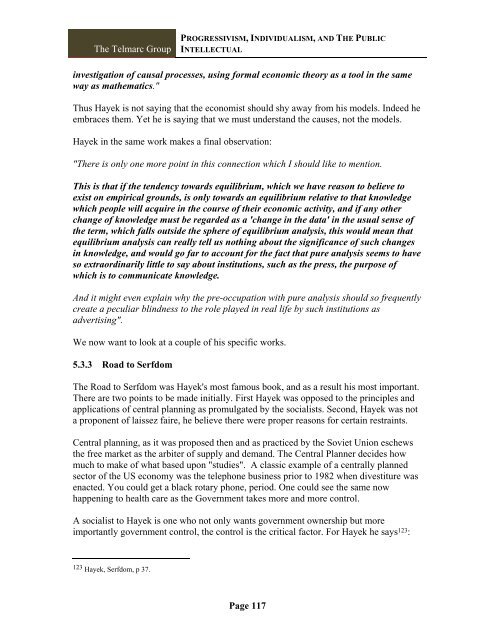progressivism, individualism, and the public ... - Telmarc Group
progressivism, individualism, and the public ... - Telmarc Group
progressivism, individualism, and the public ... - Telmarc Group
You also want an ePaper? Increase the reach of your titles
YUMPU automatically turns print PDFs into web optimized ePapers that Google loves.
The <strong>Telmarc</strong> <strong>Group</strong><br />
PROGRESSIVISM, INDIVIDUALISM, AND THE PUBLIC<br />
INTELLECTUAL<br />
investigation of causal processes, using formal economic <strong>the</strong>ory as a tool in <strong>the</strong> same<br />
way as ma<strong>the</strong>matics."<br />
Thus Hayek is not saying that <strong>the</strong> economist should shy away from his models. Indeed he<br />
embraces <strong>the</strong>m. Yet he is saying that we must underst<strong>and</strong> <strong>the</strong> causes, not <strong>the</strong> models.<br />
Hayek in <strong>the</strong> same work makes a final observation:<br />
"There is only one more point in this connection which I should like to mention.<br />
This is that if <strong>the</strong> tendency towards equilibrium, which we have reason to believe to<br />
exist on empirical grounds, is only towards an equilibrium relative to that knowledge<br />
which people will acquire in <strong>the</strong> course of <strong>the</strong>ir economic activity, <strong>and</strong> if any o<strong>the</strong>r<br />
change of knowledge must be regarded as a 'change in <strong>the</strong> data' in <strong>the</strong> usual sense of<br />
<strong>the</strong> term, which falls outside <strong>the</strong> sphere of equilibrium analysis, this would mean that<br />
equilibrium analysis can really tell us nothing about <strong>the</strong> significance of such changes<br />
in knowledge, <strong>and</strong> would go far to account for <strong>the</strong> fact that pure analysis seems to have<br />
so extraordinarily little to say about institutions, such as <strong>the</strong> press, <strong>the</strong> purpose of<br />
which is to communicate knowledge.<br />
And it might even explain why <strong>the</strong> pre-occupation with pure analysis should so frequently<br />
create a peculiar blindness to <strong>the</strong> role played in real life by such institutions as<br />
advertising".<br />
We now want to look at a couple of his specific works.<br />
5.3.3 Road to Serfdom<br />
The Road to Serfdom was Hayek's most famous book, <strong>and</strong> as a result his most important.<br />
There are two points to be made initially. First Hayek was opposed to <strong>the</strong> principles <strong>and</strong><br />
applications of central planning as promulgated by <strong>the</strong> socialists. Second, Hayek was not<br />
a proponent of laissez faire, he believe <strong>the</strong>re were proper reasons for certain restraints.<br />
Central planning, as it was proposed <strong>the</strong>n <strong>and</strong> as practiced by <strong>the</strong> Soviet Union eschews<br />
<strong>the</strong> free market as <strong>the</strong> arbiter of supply <strong>and</strong> dem<strong>and</strong>. The Central Planner decides how<br />
much to make of what based upon "studies". A classic example of a centrally planned<br />
sector of <strong>the</strong> US economy was <strong>the</strong> telephone business prior to 1982 when divestiture was<br />
enacted. You could get a black rotary phone, period. One could see <strong>the</strong> same now<br />
happening to health care as <strong>the</strong> Government takes more <strong>and</strong> more control.<br />
A socialist to Hayek is one who not only wants government ownership but more<br />
importantly government control, <strong>the</strong> control is <strong>the</strong> critical factor. For Hayek he says 123 :<br />
123 Hayek, Serfdom, p 37.<br />
Page 117












